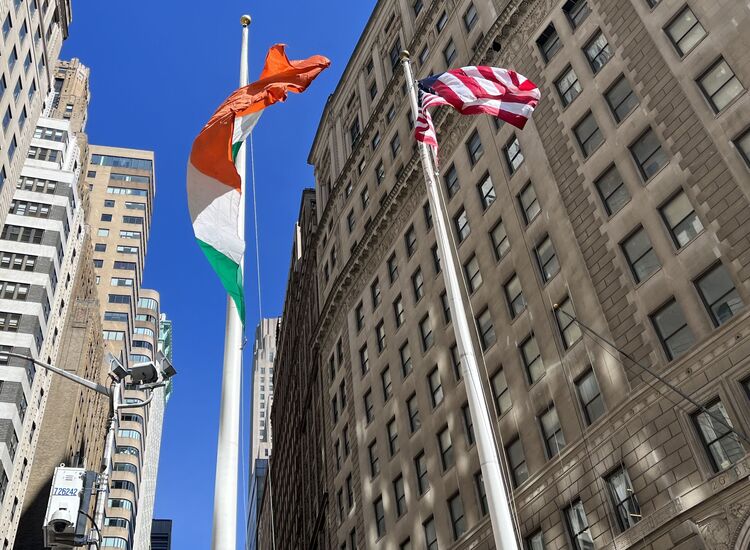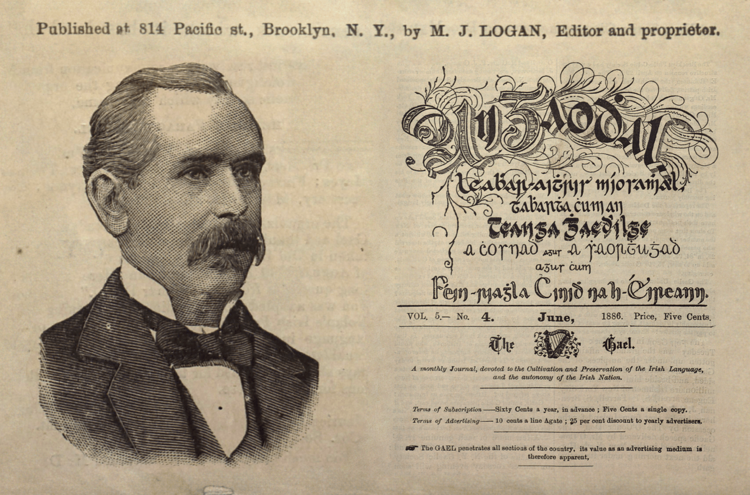"Unintended Consequences" brings an Irish and Irish American perspective to the always contentious issue of immigration
By Ray O'Hanlon
Today is the day - at least according to Amazon.
"Unintended Consequences, The Story Of Irish Immigration To The U.S. And How America's Door Was Closed To The Irish" is officially out there in the wide world after a couple of Covid-19 related delays.
Its story is focused on the Irish, on Irish America, and also on America and its long and oft tortured relationship with immigration.
The title of the book gives a clue to an essential truth in the tale. America did not deliberately close its door on the Irish. But the door was closed nevertheless. The only deliberate door closing on a particular race/ethnicity/nationality in the nation's history was directed at the Chinese in the 1880s.
America, of course, is unique in that it is an amalgam of everybody's story, the Irish included. And it is one incredible tale.
My book is something of a broad brush because the details of the Irish American story would fill a library, never mind between the covers of one book.
But I believe this book succeeds with regard to where we were, where we are, and why. Where we will be is yet to be seen.
UC focuses in significant part on the 1965 Immigration and Nationality Act. The cover shows President Lyndon Johnson signing the act into law on Liberty Island in New York Harbor. It was a moment that would not only change the course of Irish America's story, but also America's story.
I see the act as being in the spirit of its time, of being in the mold of the voting and civil rights acts. It has a strong moral core. It was intended to make immigration fairer and more equitable and in many respects it succeeded in these respects. But there were those unintended consequences. They have played out on the full American stage, but the Irish stand out in a very particular way because they have always stood out in America's grand story in terms of raw numbers, in terms of dedication and loyalty to their adopted nation, in terms of a singular cultural input. Many have given their lives for America.
The fallout from the '65 act, in the eyes of activist Irish Americans of that time, was a burdensome negative. And they reacted as we would always expect them to react. They banded together and went into battle, the political and legislative version.
And so we have the work of the American Irish National Immigration Committee led by Judge John Collins and Father Donald O'Callaghan. AINIC took its case to Irish America and to Washington, D.C. in the late 1960s and early 1970s. This was only the start of an immigration reform campaign that has lasted, in one way or another, up until the present day.
In the 1980s and '90s we see the work of the Irish Immigration Reform Movement. In the opening decade of this century the Irish Lobby For Immigration Reform took up the campaign banner and carried it into the second decade. The Ancient Order of Hibernians were a constant presence through all the decades.
As well as legislative battles, UC devotes chapters to emphasizing the unbreakable bonds between Ireland and America and the power of sentiment that is in such large part the underpinning of those bonds. We can never underestimate the power of such sentiment, even in the face of seemingly unsurmountable political, economic and social circumstance.
UC weighs in at 353 pages including the index. It's important to take note of the index. It contains numerous entries. But the reason why the book exists at all is not fully reflected in it. The story of America's Irish is made up of literally millions of parts, most crucially the stories of families and individuals who have lived and loved, have struggled and overcome life's challenges, have passed on while handing down legacies that speak lovingly of homeland and adopted homeland.
This is their story. This book is for all of them and that, of course, includes the long term undocumented Irish.
I would like to acknowledge my Ireland-based publisher Merrion Press. I felt that it would be particularly appropriate that this book first see the light of day in Ireland. But of course the larger setting for the story is America. So it seems appropriate indeed that as well as being printed in Ireland the book is also undergoing a separate print run in the U.S., and that is taking place in Chicago.
I would like to acknowledge the input and support of organizations including the AOH, the Irish Institute of New York and Tara Circle Inc. I also extend gratitude and thanks to all who have given of their time and energy to the cause of reopening America's door to the Irish. Some are in the foreground, most in the background. My thanks to authors of other works that I have drawn upon, and a special thanks to those who read the manuscript and rendered judgement.
Nobody wants to see large scale forced migration from Ireland ever again. That is, and has to be, in the past. But I believe neither should we be facing a situation where individual Irish people are almost entirely unable to make a pitch for an American life simply because they were born in Ireland.
America's door doesn't have to be flung wide open for the Irish. But it should be reopened to a degree that is appropriate in the context of an advancing and prosperous Ireland. There should yet be a legal Irish version of the American Dream.
Should that moment be achieved, should the door be sufficiently opened, it will be an intended consequence for an America made rich by the the peoples of all nations, Ireland proudly among them.








